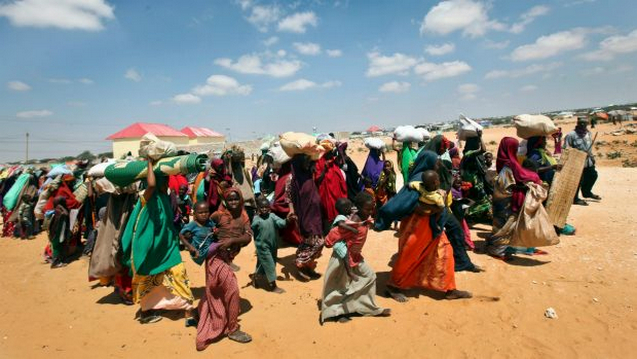Former Defence Force officers, including a former chief of the Australian military, have warned that climate change will emerge as the defining security threat of the 21st century and urged governments to step up their responses accordingly.
The warnings come as the Senate convenes an inquiry into the national security implications of the environmental phenomenon, called by Greens senator Scott Ludlam. The government has dismissed the move, arguing it is unnecessary because of actions already being taken by the Defence Force.
Climate policy debate intensifies
Politicians from all sides have been very willing to share their thoughts on climate policy and the government's plan for a clean energy target.
Politicians from all sides have been very willing to share their thoughts on climate policy and the government's plan for a clean energy target.
Mr Barrie said the world's governments were not on track to keep warming to 2 degrees celsius – the target laid out in the Paris climate accord – and said the impacts on humanity could be "long, slow, lingering and horrible".
"I think the climate change threat is pretty damn serious and we have fiddled around in terms of getting in place the right systems to head off the worst outcomes," he told Fairfax Media, calling for measured adaptation by the military and other sectors and rapid global reduction of emissions.
"The military have been working on it but their perspective is limited to responses to natural disasters and protecting bases. They are not at the forefront of heading off the challenge. That is the responsibility of the leadership at the very top and the community."
Experts have warned that Australia lies in a region described as "disaster alley", with booming populations that are exposed to cyclones, rising sea levels and extreme weather. These threats are predicted to worsen and unleash waves of climate refugees.
The 2016 Defence White Paper labelled climate change a "major challenge for countries in Australia's immediate region". Since then, Defence has established a climate security adviser in its upper echelons and factored in environmental planning and risk into its operations. They are also trying to reduce their greenhouse gas emissions.
 |
| Jackson Kiloe, the Premier of Taro in the Solomon Islands, standing where the shoreline used to be. Photo: Penny Stephens |
Defence has also completed a study into the impact of sea level rise, flooding, storm surge and coastal erosion on bases and is conducting a similar analysis on the ability of training sites to continue under environmental upheaval.
 |
| Families internally displaced by drought arrive at makeshift camps in the Tabelaha area on the outskirts of Mogadishu, Somalia. Photo: AP |
"I think it's the defining threat of this century. I can't think of any other threat that is transforming the planet on this level or scale. It's such a ubiquitous threat," he said.
"People might say terror is a threat and that's true but I don't think it's anywhere near what climate change is presenting itself as."
An often cited example of the environment as a "threat multiplier" is the severe, four-year drought that preceded the Syrian civil war, which has killed more than 400,000 people and displaced more than five million. The drought forced regional farmers and workers into the cities and created food shortages and political instability.
Mr Thomas praised the Defence Force for its work so far but said they had been handicapped by a decade of fraught political debates and policy uncertainty, comparing it to the unpredictable nature of national energy policy.
In a September 2016 address, Chief of Army Lieutenant General Angus Campbell warned that the 10 countries most at risk of sea level rise were in Australia's immediate region.
Lieutenant General Campbell compared the estimated cost of inaction, a 23 per cent hit to global GDP by 2100, to the cost of action, 1.6 per cent impact by 2050. He expressed fear that climate change was "the ultimate threat multiplier".
Links
- 'Disaster alley': Cyclone Debbie shows how climate change will test Australia's military
- White House proposes steep budget cut to leading climate science agency
- Taking aim at climate change: Australia's military sees rising risks
- Exploring The Security Risks of Climate Change
- Climate change curbs must be central to foreign policy, Australia told
- As doom approaches, Australia closes its eyes
- Climate challenges line up in Australia's front and back yards
- Climate forces consolidate as coal backers rush for government help

No comments:
Post a Comment